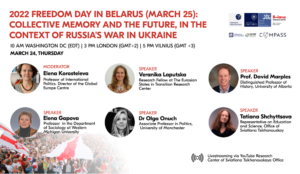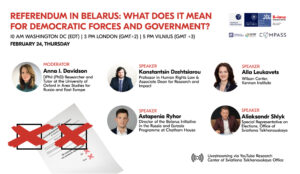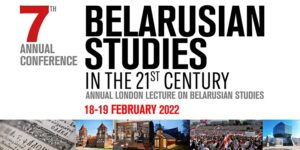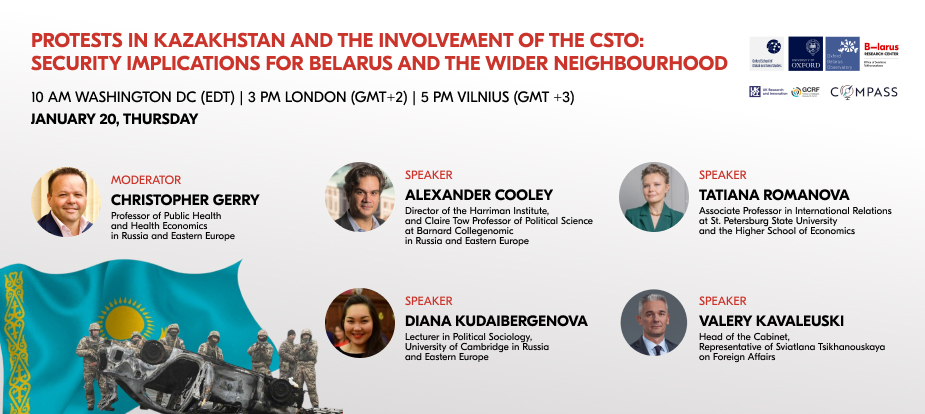30 March – ‘The Eurasian Economic Union (EAEU) as an Order-Making Actor (OMA)’ – Mr Huawei Zheng
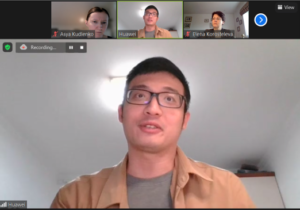 On 30 March 2022, the University of Kent team hosted the last WiPS of the project with Mr Huawei Zheng, a PhD candidate at the School of Politics and International Relations. His presentation summarised the core argument of his PhD thesis and the content of each chapter. Against the decentralising transformation that international order is undergoing, Mr Zheng’s thesis introduces a novel idea of order-making actors (OMAs). It explores the extent to which the Eurasian Economic Union (EAEU) is such an OMA that can shape the international environment as it sees fit.
On 30 March 2022, the University of Kent team hosted the last WiPS of the project with Mr Huawei Zheng, a PhD candidate at the School of Politics and International Relations. His presentation summarised the core argument of his PhD thesis and the content of each chapter. Against the decentralising transformation that international order is undergoing, Mr Zheng’s thesis introduces a novel idea of order-making actors (OMAs). It explores the extent to which the Eurasian Economic Union (EAEU) is such an OMA that can shape the international environment as it sees fit.
Select Committee, House of Commons, 17 March 2022:
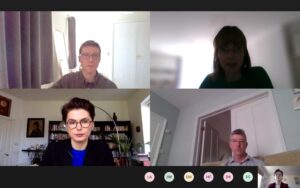 Professor Elena Korosteleva was invited to speak before the select committee of Foreign Affairs, House of Commons, on 17 March, at a closed session, focusing on Russia’s war in Ukraine and Belarus’s regime involvement. Other speakers included Prof. Andrew Wilson, UCL SSEES, and Orysia Lutsevich, Chatham House. Prof. Korosteleva reiterated the urgency to discriminate between the regime’s actions and the people: the latter, when are forced to flee Belarus (and Russia), should be treated with the same levels of compassion and support, including provision of humanitarian visas, as the Ukrainian refugees. This also concerns fleeing scholars who openly opposed the regime, by standing against the war, and who require every support from the UK and European universities.
Professor Elena Korosteleva was invited to speak before the select committee of Foreign Affairs, House of Commons, on 17 March, at a closed session, focusing on Russia’s war in Ukraine and Belarus’s regime involvement. Other speakers included Prof. Andrew Wilson, UCL SSEES, and Orysia Lutsevich, Chatham House. Prof. Korosteleva reiterated the urgency to discriminate between the regime’s actions and the people: the latter, when are forced to flee Belarus (and Russia), should be treated with the same levels of compassion and support, including provision of humanitarian visas, as the Ukrainian refugees. This also concerns fleeing scholars who openly opposed the regime, by standing against the war, and who require every support from the UK and European universities.
OBO-OST-COMPASS webinar, ‘2022 Freedom Day in Belarus (March 25): Collective Memory and the Future in the context of Russia’s War in Ukraine’, 24 March 2022
16 March – “Routines and Routinization in World Politics” – Dr Filip Ejdus
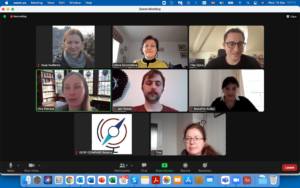 On 16 March 2022, the University of Kent team hosted a WiPS discussion with Dr Filip Ejdus (Faculty of Political Science, University of Belgrade). Dr Ejdus spoke about the concept of routines in IR. Despite the recent interest in the “practice turn” and the “logic of habit” in world politics, routines have been either ignored altogether or used interchangeably with practices and habits. Even in ontological security studies, where the stability of routines is part and parcel of the core theoretical argument, the conceptualization of routines has been rather thin. By drawing on insights from organizational and behavioural sciences and with illustrations from world politics, Dr Ejdus posited that routines are a phenomenon close but analytically distinct from both practices and habits.
On 16 March 2022, the University of Kent team hosted a WiPS discussion with Dr Filip Ejdus (Faculty of Political Science, University of Belgrade). Dr Ejdus spoke about the concept of routines in IR. Despite the recent interest in the “practice turn” and the “logic of habit” in world politics, routines have been either ignored altogether or used interchangeably with practices and habits. Even in ontological security studies, where the stability of routines is part and parcel of the core theoretical argument, the conceptualization of routines has been rather thin. By drawing on insights from organizational and behavioural sciences and with illustrations from world politics, Dr Ejdus posited that routines are a phenomenon close but analytically distinct from both practices and habits.
OBO-OST-COMPASS webinar ‘Ukraine-Belarus relations: going beyond the war’, 10 March 2022
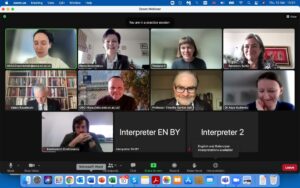 This weekly webinar organised by the Oxford Belarus Observatory (OBO) OSGA, conjointly with the Research Centre of the Office of Sviatlana Tsikhanouskaya (OST), and the GCRF COMPASS project, focused on the increasingly difficult relations between the two nations, caused by the supportive position of Lukashenko’s regime of Russia’s war in Ukraine. While the majority of Belarusians strongly oppose the war, the external perceptions, especially by suffering Ukraine, are less discriminating, leading to stigmatisation, and exclusion of fleeing Belarusians from humanitarian channels of support. To discuss how these brotherly relations could remedied, the speakers included Valery Kavaleuski, Head of the Cabinet, Representative of Sviatlana Tsikhanouskaya on Foreign Affairs; Baroness Suttie, member of the House of Lords; Timothy Garton-Ash, Isaiah Berlin Professor at St Antony’s College Oxford; Dr Asya Kudlenko, postdoctoral Associate, GCRF COMPASS, University of Kent and Kanstantsin Dzehtsiarou, Professor of Law, Liverpool University; moderated by Prof. Elena Korosteleva. The full discussion can be followed here [https://www.youtube.com/watch?v=KMRS0xw_Tj0] and the policy brief will be available in a week’s time. Please join these weekly webinars on Thursdays at 15.00 UK time, by registering here.
This weekly webinar organised by the Oxford Belarus Observatory (OBO) OSGA, conjointly with the Research Centre of the Office of Sviatlana Tsikhanouskaya (OST), and the GCRF COMPASS project, focused on the increasingly difficult relations between the two nations, caused by the supportive position of Lukashenko’s regime of Russia’s war in Ukraine. While the majority of Belarusians strongly oppose the war, the external perceptions, especially by suffering Ukraine, are less discriminating, leading to stigmatisation, and exclusion of fleeing Belarusians from humanitarian channels of support. To discuss how these brotherly relations could remedied, the speakers included Valery Kavaleuski, Head of the Cabinet, Representative of Sviatlana Tsikhanouskaya on Foreign Affairs; Baroness Suttie, member of the House of Lords; Timothy Garton-Ash, Isaiah Berlin Professor at St Antony’s College Oxford; Dr Asya Kudlenko, postdoctoral Associate, GCRF COMPASS, University of Kent and Kanstantsin Dzehtsiarou, Professor of Law, Liverpool University; moderated by Prof. Elena Korosteleva. The full discussion can be followed here [https://www.youtube.com/watch?v=KMRS0xw_Tj0] and the policy brief will be available in a week’s time. Please join these weekly webinars on Thursdays at 15.00 UK time, by registering here.
OBO-OST-COMPASS webinar ‘Russia’s war in Ukraine, and the referendum in Belarus: what happens next?’, 3 March 202
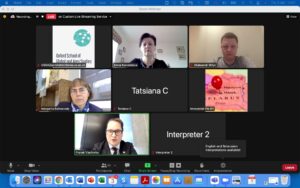 This weekly webinar organised by the Oxford Belarus Observatory (OBO) OSGA, conjointly with the Research Centre of the Office of Sviatlana Tsikhanouskaya (OST), and the GCRF COMPASS project, reflected on the challenges presented by the results of the manipulated referendum in Belarus, connecting them to the ongoing Russian aggression against Ukraine. The speakers included Franak Viachorka, Senior Advisor to Sviatlana Tsikhanouskaya, Head of the Foreign Policy Department; Aliaksandr Shlyk, Special Representative on Elections, Office of Sviatlana Tsikhanouskaya; Margarita Balmaceda, Professor of Diplomacy and IR at Seton Hall University, and Lord Teverson, member of the House of Lords specialising in European, energy and environmental issues, and an active member of the IAB COMPASS; moderated by Prof. Elena Korosteleva. The discussion underscored a growing concern over Belarus’ involvement in the Russian war with Ukraine; and the loss of neutrality and nuclear-free status by Belarus as a result of the illegitimate referendum. The full discussion can be followed here [https://www.youtube.com/watch?v=XwXjpqi0vkY], and the policy brief will be available in a week’s time. Please join these weekly webinars on Thursdays at 15.00 UK time, by registering here.
This weekly webinar organised by the Oxford Belarus Observatory (OBO) OSGA, conjointly with the Research Centre of the Office of Sviatlana Tsikhanouskaya (OST), and the GCRF COMPASS project, reflected on the challenges presented by the results of the manipulated referendum in Belarus, connecting them to the ongoing Russian aggression against Ukraine. The speakers included Franak Viachorka, Senior Advisor to Sviatlana Tsikhanouskaya, Head of the Foreign Policy Department; Aliaksandr Shlyk, Special Representative on Elections, Office of Sviatlana Tsikhanouskaya; Margarita Balmaceda, Professor of Diplomacy and IR at Seton Hall University, and Lord Teverson, member of the House of Lords specialising in European, energy and environmental issues, and an active member of the IAB COMPASS; moderated by Prof. Elena Korosteleva. The discussion underscored a growing concern over Belarus’ involvement in the Russian war with Ukraine; and the loss of neutrality and nuclear-free status by Belarus as a result of the illegitimate referendum. The full discussion can be followed here [https://www.youtube.com/watch?v=XwXjpqi0vkY], and the policy brief will be available in a week’s time. Please join these weekly webinars on Thursdays at 15.00 UK time, by registering here.
Russia’s war in Ukraine, TRT interview with Prof. Korosteleva
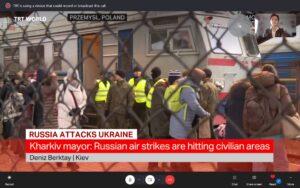 Prof. Korosteleva was interviewed today by TRT TV for the afternoon news programmes. She spoke about the need to clearly distinguish the regimes’ – Putin’s and Lukashenko’s – war against Ukraine, and the peoples’ – Belarusians and Russians – support for Ukraine, which take them to streets daily to protest, in full knowledge of the vindictive measures these regimes will apply to quell the dissent. Belarus was a precursor to the Russian government’s aggression against Ukraine, and the international community now need to act fast to stop the war and the killing of innocent people. For more information see here [link to be supplied shortly].
Prof. Korosteleva was interviewed today by TRT TV for the afternoon news programmes. She spoke about the need to clearly distinguish the regimes’ – Putin’s and Lukashenko’s – war against Ukraine, and the peoples’ – Belarusians and Russians – support for Ukraine, which take them to streets daily to protest, in full knowledge of the vindictive measures these regimes will apply to quell the dissent. Belarus was a precursor to the Russian government’s aggression against Ukraine, and the international community now need to act fast to stop the war and the killing of innocent people. For more information see here [link to be supplied shortly].
ECR Eastern Neighbourhood Summit, 1-2 March 2022
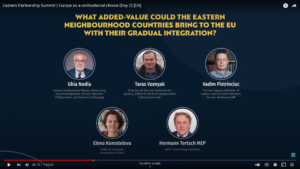 Professor Korosteleva was invited to speak at the Eastern Neighbourhood Summit, organised by the European Conservatives and Reformists Group in the European Parliament. Notably, Prof. Korosteleva was asked to comment on the limitations of the EaP, among which she highlighted the EU reactive response to the events in the east, failure to understand the Revolution of Indignation in Belarus as a precursor of the war in Ukraine and the need to engage with RESILIENCE properly, as a policy supported by the EU, but not yet put to practice.
Professor Korosteleva was invited to speak at the Eastern Neighbourhood Summit, organised by the European Conservatives and Reformists Group in the European Parliament. Notably, Prof. Korosteleva was asked to comment on the limitations of the EaP, among which she highlighted the EU reactive response to the events in the east, failure to understand the Revolution of Indignation in Belarus as a precursor of the war in Ukraine and the need to engage with RESILIENCE properly, as a policy supported by the EU, but not yet put to practice.
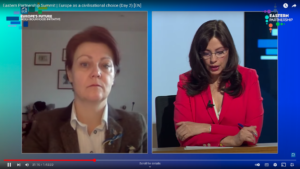
For the brief description of the programme please access here and for the recording of the discussion – here https://www.youtube.com/c/ECRgroupEU.
Russia’s War Against Ukraine and Referendum in Belarus: What Happens Next?
Next Belarus Research Centre / Oxford Belarus Observatory (OBO) Event, 3rd March 2022:
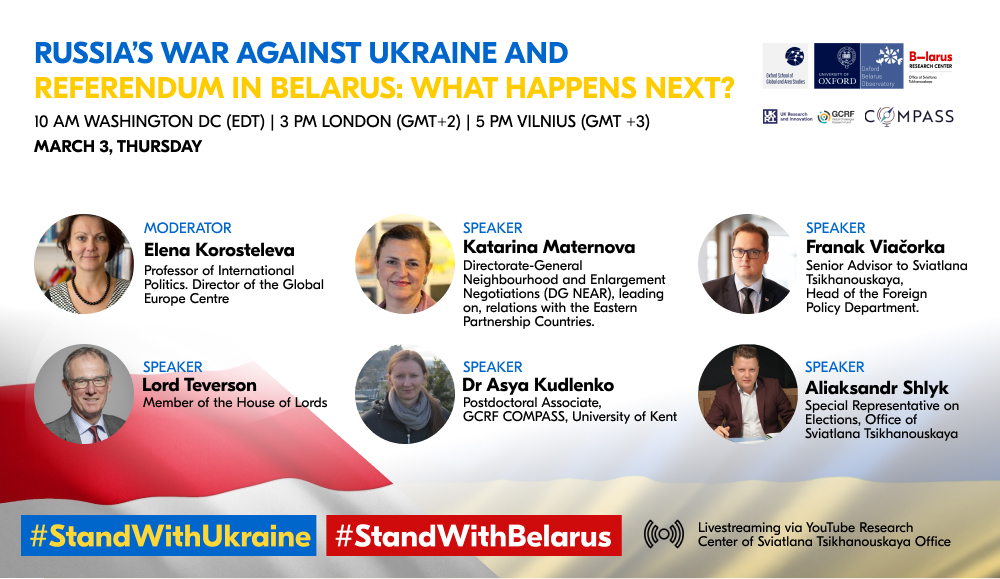
Cambridge Central Asia Forum & Centre of Development Studies Seminar Series
Paper 400 Friday Required Seminar
Lent Term 2022
11-1pm Fridays Term Time
Room SG2 Alison Richard Building (In Person)
And Zoom Registration https://cam-ac-uk.zoom.us/meeting/register/tJYvcO2qqj4pG9Typ7Ia4fD6vhc5LvGlzqkn
21 January Panel Discussion on the Recent Events in Kazakhstan (Internal Event)
28 January Mirzohid Rahimov, Uzbekistan Academy of Sciences, ‘Intra and extra Regionalism in Central Asia: Challenges and Perspectives’
4 February Address by His Excellency, Elin Suleymanov, Ambassador of the Republic of Azerbaijan to the UK
11 February Christina Crawford, Emory University, ‘Socialism Means Housing: Architecture + Planning in Early Soviet Baku’
18 February Sinead Mowlds, Cambridge Central Asia Forum, ‘Evidence-informed Decision-making for Sustainable Development in Uzbekistan: Spatial Data’
25 February Serik Orazgaliyev, Nazarbayev University, Kazakhstan, ‘Fragmentation, social media and democracy in Kazakhstan’
4 March Erika Monahan, Dartmouth College, ‘Mapping the Karakum: A Russian View of Central Asia’
11 March Yingfeng Ji, University of Cambridge, Multi-stakeholder Partnership in China’s Belt and Road Initiative: Evidence from projects in Kazakhstan
19 March Navroz and Roudtable, Jesus College Chapel
Everyone is welcome.
February Trip to Estonia
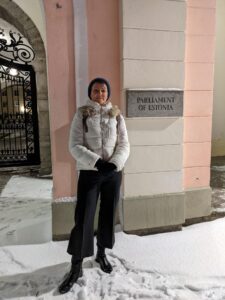
Prof. Korosteleva visited Estonia with a working trip to the Estonia Parliament and universities. As part of this visit, the situation in Belarus and Ukraine was discussed with the policy-makers, and new funding opportunities were planned for the future.
Channel 4 News Article: Could UK go to war with Russia and could there be nuclear conflict?
Professor Elena Korosteleva was contacted by Channel 4 News to provide factual information for the article: Could UK go to war with Russia and could there be nuclear conflict?
OBO-OST-COMPASS webinar, ‘Referendum in Belarus: what does it mean for Democratic Forces and Government?’, 24 February 2022
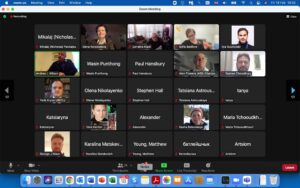 Professor Korosteleva was invited to give a keynote during a two-day annual conference of Belarusian Studies, run by UCL SSEES. The keynote was entitled ‘Complexity, Resilience, and the Political: understanding the many crises in Belarus’. It focused on various crises in Belarus – from institutional, humanitarian, economic, political, and societal – with the latter being considered as most profound. As Prof. Korosteleva argued, this has facilitated deep transformation of the Belarusian society leading to irreversible change associated with the rise of Belarusian peoplehood in the revolution of indignation.
Professor Korosteleva was invited to give a keynote during a two-day annual conference of Belarusian Studies, run by UCL SSEES. The keynote was entitled ‘Complexity, Resilience, and the Political: understanding the many crises in Belarus’. It focused on various crises in Belarus – from institutional, humanitarian, economic, political, and societal – with the latter being considered as most profound. As Prof. Korosteleva argued, this has facilitated deep transformation of the Belarusian society leading to irreversible change associated with the rise of Belarusian peoplehood in the revolution of indignation.
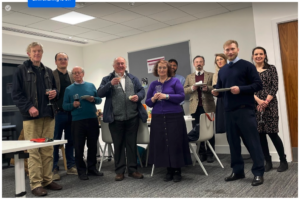 The full programme is available here [https://www.eventbrite.com/e/7th-annual-belarusian-studies-in-the-21st-century-conference-tickets-230720219387], and the recording of the lecture – here [to be provided soon].
The full programme is available here [https://www.eventbrite.com/e/7th-annual-belarusian-studies-in-the-21st-century-conference-tickets-230720219387], and the recording of the lecture – here [to be provided soon].
OBO-OST-COMPASS webinar ‘Nuclear-free Belarus: is it in danger?’, 17 February 2022
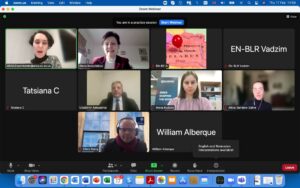 A fifth webinar organised by the Oxford Belarus Observatory (OBO) OSGA, conjointly with the Research Centre of the Office of Sviatlana Tsikhanouskaya (OST), and the GCRF COMPASS project, discussed current dangers and concerns in relation to the recent statements by Belarus’ government to host Russian nuclear weapons on its territory. The speakers included a former diplomat Uladzimir Astapenka, member of the National Anti-crisis Management Council, responsible for multilateral diplomacy; Alena Kudzko, GLOBSEC Vice-President and Director of the GLOBSEC Policy Institute; Alicia Sanders-Zakre, Research and Policy Coordinator, International Campaign to Abolish Nuclear Weapons (ICAN); and William Alberque, Director of Strategy, Technology, and Arms Control, International Institute for Strategic Studies Berlin; moderated by Prof. Elena Korosteleva. The discussion highlighted real dangers of entrusting Lukashenka’s regime with nuclear weapons, which the authorities intend to use as geopolitical blackmail for advancing their demands. Given the unpredictable, and highly unstable nature of the Belarusian leadership, it is a matter of urgency for the international community to enforce law on Belarus, as part of the Treaty on the Prohibition of Nuclear Weapons, and regularly monitor its implementation, to hold the government to account. The discussion could be followed here [https://www.youtube.com/watch?v=KITeAOrLqFg], and the policy brief will be available in a week’s time. Please join these weekly webinars on Thursdays at 15.00 UK time, by registering here.
A fifth webinar organised by the Oxford Belarus Observatory (OBO) OSGA, conjointly with the Research Centre of the Office of Sviatlana Tsikhanouskaya (OST), and the GCRF COMPASS project, discussed current dangers and concerns in relation to the recent statements by Belarus’ government to host Russian nuclear weapons on its territory. The speakers included a former diplomat Uladzimir Astapenka, member of the National Anti-crisis Management Council, responsible for multilateral diplomacy; Alena Kudzko, GLOBSEC Vice-President and Director of the GLOBSEC Policy Institute; Alicia Sanders-Zakre, Research and Policy Coordinator, International Campaign to Abolish Nuclear Weapons (ICAN); and William Alberque, Director of Strategy, Technology, and Arms Control, International Institute for Strategic Studies Berlin; moderated by Prof. Elena Korosteleva. The discussion highlighted real dangers of entrusting Lukashenka’s regime with nuclear weapons, which the authorities intend to use as geopolitical blackmail for advancing their demands. Given the unpredictable, and highly unstable nature of the Belarusian leadership, it is a matter of urgency for the international community to enforce law on Belarus, as part of the Treaty on the Prohibition of Nuclear Weapons, and regularly monitor its implementation, to hold the government to account. The discussion could be followed here [https://www.youtube.com/watch?v=KITeAOrLqFg], and the policy brief will be available in a week’s time. Please join these weekly webinars on Thursdays at 15.00 UK time, by registering here.
16 February – “Communities, relationality and democratic politics” – Professor Milja Kurki
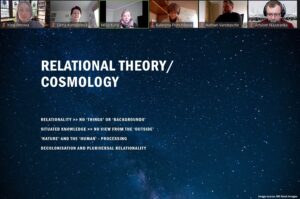 On 16 February 2022, the University of Kent team hosted a WiPS discussion with Professor Milja Kurki (Department of International Politics, Aberystwyth University, UK). Professor Kurki presented her new research project focusing on politics, political community and democracy in the context of relational theory. The talk addressed three themes: 1. Relationality: its importance for IR; trends in the field on relational thought and the author’s own orientation to/from relational perspective associated with the ideas of relational cosmology. 2. Democracy: why relationality is of interest in relation to democratic theory and practice, identifying what kinds of questions emerge for democratic theory from this perspective. 3. Communities: in particular, how this discussion relates to issues around ‘communities’ in the context of relational theory, climate change debates and posthumanism.
On 16 February 2022, the University of Kent team hosted a WiPS discussion with Professor Milja Kurki (Department of International Politics, Aberystwyth University, UK). Professor Kurki presented her new research project focusing on politics, political community and democracy in the context of relational theory. The talk addressed three themes: 1. Relationality: its importance for IR; trends in the field on relational thought and the author’s own orientation to/from relational perspective associated with the ideas of relational cosmology. 2. Democracy: why relationality is of interest in relation to democratic theory and practice, identifying what kinds of questions emerge for democratic theory from this perspective. 3. Communities: in particular, how this discussion relates to issues around ‘communities’ in the context of relational theory, climate change debates and posthumanism.
OBO-OST-COMPASS webinar ‘Olaf Scholz as the new Chancellor of Germany: what are the implications for Belarus as a country?’, 10 February 2022
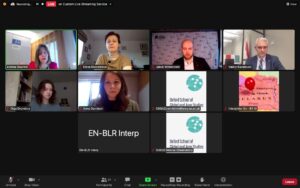 A fourth webinar organised by the Oxford Belarus Observatory (OBO) OSGA, conjointly with the Research Centre of the Office of Sviatlana Tsikhanouskaya (OST), and the GCRF COMPASS project, focused on the implications of the new German Chancellorship for Belarus as a country. The speakers included Valery Kavaleuski, Head of the Cabinet OST, Representative on Foreign Affairs; Olga Dryndova, Contributing editor “Belarus-Analysen”, expert of Politics and society in Belarus; Prof. Andrea Gawrich, Vice Dean, Faculty of Social Sciences and Cultural Studies, Institute for Political Sciences, Justus Liebig University Giesen, and Dr Jakob Wollenstein, Head of the Belarus Office, Konrad-Adenauer-Stiftung Foundation, moderated by Dr Anna Davidson (Oxford) and Prof. Elena Korosteleva. The discussion highlighted a gap in treating Belarus, and its democratic forces as an independent actor of international relations, rather than a mere extension/instrument of Russia’s foreign policy. A more consolidated and consistent approach from Germany is also needed, to develop a clear strategy towards the authoritarian states which break international law. The link to the discussion is available here. Please join these weekly webinars on Thursdays at 15.00 UK time, by registering here.
A fourth webinar organised by the Oxford Belarus Observatory (OBO) OSGA, conjointly with the Research Centre of the Office of Sviatlana Tsikhanouskaya (OST), and the GCRF COMPASS project, focused on the implications of the new German Chancellorship for Belarus as a country. The speakers included Valery Kavaleuski, Head of the Cabinet OST, Representative on Foreign Affairs; Olga Dryndova, Contributing editor “Belarus-Analysen”, expert of Politics and society in Belarus; Prof. Andrea Gawrich, Vice Dean, Faculty of Social Sciences and Cultural Studies, Institute for Political Sciences, Justus Liebig University Giesen, and Dr Jakob Wollenstein, Head of the Belarus Office, Konrad-Adenauer-Stiftung Foundation, moderated by Dr Anna Davidson (Oxford) and Prof. Elena Korosteleva. The discussion highlighted a gap in treating Belarus, and its democratic forces as an independent actor of international relations, rather than a mere extension/instrument of Russia’s foreign policy. A more consolidated and consistent approach from Germany is also needed, to develop a clear strategy towards the authoritarian states which break international law. The link to the discussion is available here. Please join these weekly webinars on Thursdays at 15.00 UK time, by registering here.
Policy Brief ‘Belarus’ integration with Russia: assessing the challenges for the country’
The Research Centre of Sviatlana Tsikhanouskaya Office (OST Research Centre) and the Oxford Belarus Observatory (OBO), with the support of the GCRF COMPASS project released the Policy Brief ‘Belarus’ integration with Russia: assessing the challenges for the country’. It can be accessed here.
‘Socialism Means Housing: Architecture + Planning in Early Soviet Baku’
Cambridge Central Asia Forum in collaboration with the Centre of Development Studies, University of Cambridge invites you to a talk by Christina E. Crawford, Emory University
Date: 11 February 2022 / Time: 11am-1pm (UK time)
Venue: In-person SG2, Alison Richard Building, 7 West Road, Cambridge
Online: Zoom Registration https://cam-ac-uk.zoom.us/meeting/register/tJYvcO2qqj4pG9Typ7Ia4fD6vhc5LvGlzqkn
Biography: Christina E. Crawford is Assistant Professor of Modern and Contemporary Architecture in the Art History Department at Emory University and faculty of Emory’s Russian, East European, and Eurasian Studies Program. Her first book, Spatial Revolution: Architecture and Planning in the Early Soviet Union (Cornell University Press, 2022), establishes the foundations of early Soviet urban theory and practice and is the recipient of funding from the Millard Meiss Publication Fund of the College Art Association, and a Digital Publishing in the Humanities/TOME subsidy from Emory University. Her new research, Atlanta Housing Interplay, funded by the Getty Foundation, the American Council of Learned Societies, the Graham Foundation for Advanced Studies in the Fine Arts, and the Digital Monograph Writers Workshop at Emory, supported by the Andrew W. Mellon Foundation, investigates international transfer of ideas about social housing using the first federally-funded housing projects in the US—Atlanta’s University and Techwood Homes (1933-37)—as principal nodes. She is the faculty advisor for the Architectural Studies Minor and the QSS Architectural Studies track. For more information please go to https://centralasia.group.cam.ac.uk/
OBO-OST-COMPASS webinar ‘Sanctions for, and Counter-sanctions by, Belarus: what’s the game-changer?’ 3 February 2022
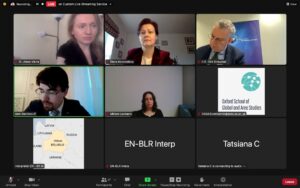 A third webinar organised by the Oxford Belarus Observatory (OBO) OSGA, conjointly with the Research Centre of the Office of Sviatlana Tsikhanouskaya (OST), and the GCRF COMPASS project, focused on the relevance and effectiveness of sanctions towards Belarus. The speakers included Aleś Alachnovič, Representative on Economic Reforms, Office of Sviatlana Tsikhanouskaya; Professor Alena Viera, University of Minho; Miriam Lexmann, MEP for Slovakia, Member of the FAC, and H.E.Dirk Schuebel, European External Action Service (EEAS), EU Ambassador to Belarus. The discussion highlighted the need to revisit the purpose of sanctions. To do so, a more joined-up approach is needed, including with the third parties; a sanction mechanism and ‘carrots’ too need to be put in place if change of behaviour were to be achieved. The link to the discussion is available here. Please join these weekly webinars on Thursdays at 15.00 UK time, by registering here.
A third webinar organised by the Oxford Belarus Observatory (OBO) OSGA, conjointly with the Research Centre of the Office of Sviatlana Tsikhanouskaya (OST), and the GCRF COMPASS project, focused on the relevance and effectiveness of sanctions towards Belarus. The speakers included Aleś Alachnovič, Representative on Economic Reforms, Office of Sviatlana Tsikhanouskaya; Professor Alena Viera, University of Minho; Miriam Lexmann, MEP for Slovakia, Member of the FAC, and H.E.Dirk Schuebel, European External Action Service (EEAS), EU Ambassador to Belarus. The discussion highlighted the need to revisit the purpose of sanctions. To do so, a more joined-up approach is needed, including with the third parties; a sanction mechanism and ‘carrots’ too need to be put in place if change of behaviour were to be achieved. The link to the discussion is available here. Please join these weekly webinars on Thursdays at 15.00 UK time, by registering here.
International conference “Cooperation Framework: Afghanistan in the Focus of the States of Central and South Asia”
Tajik National University (Tajikistan) and the Indian Institute of Management Rohtak (India) announce an international conference “Cooperation Framework: Afghanistan in the Focus of the States of Central and South Asia”.
It will be held on March 4-5, 2022, in Dushanbe (Tajikistan), at the Rudaki Avenue, 17. The application for participation and the text of the thesis/article must be sent by e-mail before February 20, 2022. Please see details here.
2 February – “Where is Eastern Europe in ‘Global IR’?” – Dr Maria Mälksoo
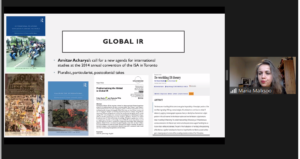
On 2 February 2022, the University of Kent team hosted a WiPS discussion with Dr Maria Mälksoo (Centre for Military Studies, Department of Political Science, University of Copenhagen). Dr Mälksoo spoke about the role and place of Central and Eastern Europe (CEE) in Global International Relations (IR). She also discussed some of the structural reasons for the underrepresentation of the scholarship from CEE universities in the leading IR journals, along with the equally modest percentage of the regionally affiliated scholars in the editorial boards of influential IR journals and in prestigious grant capture.
Policy Brief ‘Protests in Kazakhstan and the Involvement of the CSTO: Security Implications for Belarus and the Wider Neighbourhood’
The Research Centre of Sviatlana Tsikhanouskaya Office (OST Research Centre) and the Oxford Belarus Observatory (OBO), with the support of the GCRF COMPASS project released the Policy Brief ‘Protests in Kazakhstan and the Involvement of the CSTO: Security Implications for Belarus and the Wider Neighbourhood’. It can be accessed here.
OBO-OST-COMPASS webinar ‘Belarus’s Integration with Russia: assessing the challenges for the country’, 27 January 2022
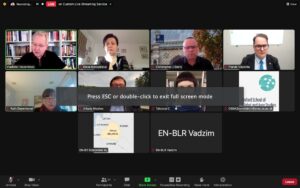 Under the aegis of the Oxford Belarus Observatory (OBO) OSGA, conjointly with the Research Centre of the Office of Sviatlana Tsikhanouskaya (OST), and the GCRF COMPASS project, the second online webinar took place on 27 January 2022, focusing on the nature, reasons and implications of the ever-closer Union State between Russia and Belarus for the latter and the wider region, especially now, at the times of hyped security across the region in relation to Russia’s looming war with Ukraine. The speakers included Franak Viačorka, Senior Advisor to Sviatlana Tsikhanouskaya, Head of the Foreign Policy Department; Prof. Vladislav Inozemtsev, Founder, Centre for Post-Industrial Studies and Professor, MSU and HSE; Dr Arkady Moshes, Programme Director for the EU Eastern Neighborhood and Russia research programme, FIIA; and Dr Ruth Deyermond, Senior Lecturer, Department of War Studies, King’s College London, moderated by Prof. Elena Korosteleva. The discussion highlighted the current tensions and the increasing politico-military nature of the Union State, which raises concerns for Belarus as a country, which prided itself on its neutrality status to date. The link to the discussion is available here. Please join these weekly webinars on Thursdays at 15.00 UK time, by registering here.
Under the aegis of the Oxford Belarus Observatory (OBO) OSGA, conjointly with the Research Centre of the Office of Sviatlana Tsikhanouskaya (OST), and the GCRF COMPASS project, the second online webinar took place on 27 January 2022, focusing on the nature, reasons and implications of the ever-closer Union State between Russia and Belarus for the latter and the wider region, especially now, at the times of hyped security across the region in relation to Russia’s looming war with Ukraine. The speakers included Franak Viačorka, Senior Advisor to Sviatlana Tsikhanouskaya, Head of the Foreign Policy Department; Prof. Vladislav Inozemtsev, Founder, Centre for Post-Industrial Studies and Professor, MSU and HSE; Dr Arkady Moshes, Programme Director for the EU Eastern Neighborhood and Russia research programme, FIIA; and Dr Ruth Deyermond, Senior Lecturer, Department of War Studies, King’s College London, moderated by Prof. Elena Korosteleva. The discussion highlighted the current tensions and the increasing politico-military nature of the Union State, which raises concerns for Belarus as a country, which prided itself on its neutrality status to date. The link to the discussion is available here. Please join these weekly webinars on Thursdays at 15.00 UK time, by registering here.
Chatham House “A referendum in Belarus: What will happen and what the West should do?”, 20 January 2022
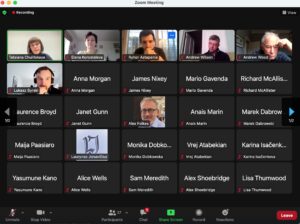 Professor Korosteleva participated in the workshop organised by the Chatham House, on the referendum in Belarus and its consequences. The workshop discussed the plans of Aliaksandr Lukashenka to run a referendum to alter the 1994 Constitution, on 27 February 2022. The consequences of this change could be far-reaching, including the emulation of Kazakhstan’s experience of ‘revolving door’ power appointments and their disastrous outcomes. The speakers were Ryhor Astapenia, Belarus Initiative Director, Chatham House; Tatsiana Chulitskaya, Academic Director, School of Young Managers in Public Administration (SYMPA); Andrew Wilson, Professor of Ukrainian studies SSEES UCL; chaired by Samanta de Bendern, Associate Fellow, Chatham House.
Professor Korosteleva participated in the workshop organised by the Chatham House, on the referendum in Belarus and its consequences. The workshop discussed the plans of Aliaksandr Lukashenka to run a referendum to alter the 1994 Constitution, on 27 February 2022. The consequences of this change could be far-reaching, including the emulation of Kazakhstan’s experience of ‘revolving door’ power appointments and their disastrous outcomes. The speakers were Ryhor Astapenia, Belarus Initiative Director, Chatham House; Tatsiana Chulitskaya, Academic Director, School of Young Managers in Public Administration (SYMPA); Andrew Wilson, Professor of Ukrainian studies SSEES UCL; chaired by Samanta de Bendern, Associate Fellow, Chatham House.
OBO-OST-COMPASS webinar ‘Protests in Kazakhstan and the CSTO involvement: security implications for Belarus and the wider region’, 20 January 2022
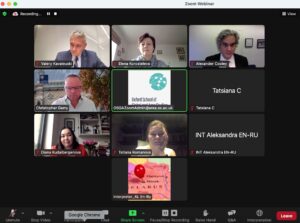 Under the aegis of the Oxford Belarus Observatory (OBO) OSGA, and the Office of Sviatlana Tsikhanouskaya (OST), with the support of the GCRF COMPASS project, the first online workshop this term took place on 20 January 2022, focusing on the implications of the protests and the deployment of CSTO forces in Kazakhstan, for Belarus and the wider region. The speakers included Dr Diana Kudaibergenova, Lecturer in Sociology, University of Cambridge; Valery Kavaleuski, Head of the OST Cabinet in charge of Foreign Affairs; Prof. Tatiana Romanova, St Petersburg State University & HSE, Russia; and Prof. alexander Cooley, Director of the Harriman Institute, Columbia University N.Y.; moderated by Prof. Chris Gerry, Head of OSGA and PI for OBO, University of Oxford. The focus of discussion was on drawing parallels between the nature of protests in Belarus (2020-21) and Kazakhstan (2022) highlighting their self-organisation and self-reliance; and on the implications of deploying CSTO forces for Belarus especially, which territory now stations its forces for training exercise. The link to the discussion is available here . Please join these weekly webinars on Thursdays at 15.00 UK time, by registering here.
Under the aegis of the Oxford Belarus Observatory (OBO) OSGA, and the Office of Sviatlana Tsikhanouskaya (OST), with the support of the GCRF COMPASS project, the first online workshop this term took place on 20 January 2022, focusing on the implications of the protests and the deployment of CSTO forces in Kazakhstan, for Belarus and the wider region. The speakers included Dr Diana Kudaibergenova, Lecturer in Sociology, University of Cambridge; Valery Kavaleuski, Head of the OST Cabinet in charge of Foreign Affairs; Prof. Tatiana Romanova, St Petersburg State University & HSE, Russia; and Prof. alexander Cooley, Director of the Harriman Institute, Columbia University N.Y.; moderated by Prof. Chris Gerry, Head of OSGA and PI for OBO, University of Oxford. The focus of discussion was on drawing parallels between the nature of protests in Belarus (2020-21) and Kazakhstan (2022) highlighting their self-organisation and self-reliance; and on the implications of deploying CSTO forces for Belarus especially, which territory now stations its forces for training exercise. The link to the discussion is available here . Please join these weekly webinars on Thursdays at 15.00 UK time, by registering here.
AGRE-COMPASS workshop on the implications of connectivity for local communities in Central Eurasia, 21 January 2022
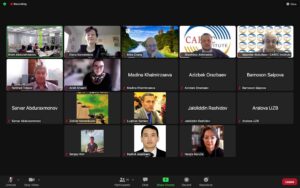 Under the aegis of the GCRF AGRE project led by Prof. Michael Crang, the University of Durham, and the GCRF COMPASS project, led by Prof. Elena Korosteleva, OBO Oxford University, Dr Akram Umarov and his Tashkent colleagues organised an international workshop ‘Enhancing Connectivity and Local Communities in Uzbekistan: building resilient and adaptive governance’. The event explored the effects of various transnational economic, political and social connectivity corridors in Central Asia and Uzbekistan specifically, and their impact on the life of local communities. Highlighting the cases like Angren-Pap railway as an international highway connecting the region, brought out many opportunities and even more challenges.
Under the aegis of the GCRF AGRE project led by Prof. Michael Crang, the University of Durham, and the GCRF COMPASS project, led by Prof. Elena Korosteleva, OBO Oxford University, Dr Akram Umarov and his Tashkent colleagues organised an international workshop ‘Enhancing Connectivity and Local Communities in Uzbekistan: building resilient and adaptive governance’. The event explored the effects of various transnational economic, political and social connectivity corridors in Central Asia and Uzbekistan specifically, and their impact on the life of local communities. Highlighting the cases like Angren-Pap railway as an international highway connecting the region, brought out many opportunities and even more challenges.
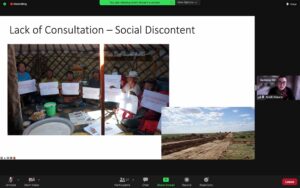 The workshop involved both local and international scholars, including Dr Arielle Ahern-Lingman and Dr Troy Sternberg (Oxford), Prof. Gulnoza Ismailova (Vice-Rector, UWED), Dr Iskandar Abdullaev (Deputy Director, CAREC Institute) and more. For the full programme please visit here . The workshop has been recorded, and the link will be available shortly.
The workshop involved both local and international scholars, including Dr Arielle Ahern-Lingman and Dr Troy Sternberg (Oxford), Prof. Gulnoza Ismailova (Vice-Rector, UWED), Dr Iskandar Abdullaev (Deputy Director, CAREC Institute) and more. For the full programme please visit here . The workshop has been recorded, and the link will be available shortly.
Next Cambridge Central Asia Forum talk , 28 January 2022
Cambridge Central Asia Forum in collaboration with the Centre of Development Studies, University of Cambridge and UKRI GCRF COMPASS Project invite you to a talk by Professor Mirzohid Rahimov, Uzbekistan Academy of Sciences on ‘Intra and extra Regionalism in Central Asia: Challenges and Perspectives’.
You can join the event in person (SG2, Alison Richard Building, University of Cambridge) or online at 11.00-13.00 on 28 January 2022. Please register here:
https://cam-ac-uk.zoom.us/meeting/register/tJYvcO2qqj4pG9Typ7Ia4fD6vhc5LvGlzqkn
International Workshop: “Enhancing connectivity and local communities in Uzbekistan: building resilient and adaptive governance”
Date: January 21, 2021. 14:30-18:00 (Tashkent time), 9:30-13:00 (London time)
Venue: Innovation and Scientific Research Cluster premises
Format: Blended (in-person and online)
Full programme and zoom link available here.
19 January – ‘‘International friendship as a relationship in the future’ – Dr Felix Berenskoetter
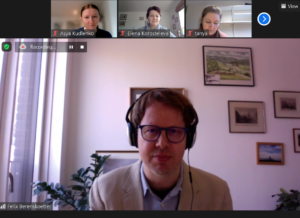
On 19 January 2022, the University of Kent team hosted a WiPS discussion with Dr Felix Berenskoetter (SOAS University of London). The talk explored what role the future plays in the construction, maintenance and breakdown of (international) friendship. Based on (a) the ontological reading of the subject as temporal, and (b) the central role of trust in friendship, it put forward the argument that shared visions of the future are a crucial element of a friendship bond.
‘Complexity, resilience and the political: understanding the many crises in Belarus’: Prof. Elena Korosteleva to deliver keynote address at the 7th Annual Conference on Belarusian Studies, 18-19 February 2022
Full details and draft Conference Programme available here.
Next Belarus Research Centre / Oxford Belarus Observatory (OBO) Event, 20th January 2022:
Moderators: Chris Gerry & Elena Korosteleva
- Valery Kavaleuski,Head of the Cabinet, Representative of Sviatlana Tsikhanouskaya on Foreign Affairs(kavaleuski@tsikhanouskaya.org)
- Diana Kudaibergenova,Lecturer in Political Sociology, Department of Sociology, University of Cambridge(dk406@cam.ac.uk)
- Tatiana Romanova,Associate Professor inInternational Relationsat St. Petersburg State University and the Higher School ofEconomics(romanova@mail.sir.edu)
- Alexander Cooley,Director of the Harriman Institute, Columbia University, New York, and Claire Tow Professor of Political Science at Barnard College (acooley@barnard.edu)
The recent (and still ongoing) protests in Kazakhstan took many by surprise. For a resource-rich country, a sharp rise in energy prices and ensuing consumer impoverishment, which contributed to the protests, have raised questions, but in truth these developments have been anticipated for years. What was truly out of the ordinary is the subsequent rapid rejigging of power configurations, and the deployment of the Collective Security Treaty Organisation (CSTO) troops to restore order. The former looked like a premeditated coup, and the latter were invited by Kazakhstan authorities, raising some serious security concerns among politicians, the military, experts and ordinary citizens. While for the international community these developments in Kazakhstan seem like another exercise of power by Russia; for Belarus this was the first deployment of its troops abroad, on a CSTO mission.What are the implications of the protests in Kazakhstan for the post-Soviet region and Belarus in particular? What do they mean also for regional and international security, in the current circumstances? What recommendations should be offered to the national and international stakeholders, regarding the CSTO’s military involvement, to restore order? These and other questions will be discussed at the expert webinar jointly convened by the Research Centre of Sviatlana Tsikhanouskaya Office(OST Research Centre) and theOxford Belarus Observatory(OBO), with the support of theGCRF COMPASS project.Please join us on Thursday, 20 January 2022, at 15.00 UK time, by registering here:Link for zoom registration:https://zoom.us/webinar/register/WN_hEaLkSr9RH6V-kIhKi6wyw
OST Research Centre and Oxford Belarus Observatory (OBO) announce a series of expert online discussions in 2022:
Changing Belarus – GCRF COMPASS book workshop on 13 January 2022
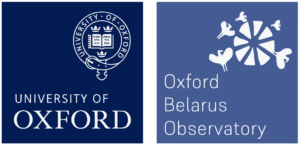 @GCRF COMPASS and @OxfordBelarus Observatoryorganised a book workshop for the forthcoming new book on Changing Belarus in the XXI Century: between dictatorship and democracy (Routledge). The workshop involved contributors presenting their draft chapters to receive further feedback from the editors and fellow authors. The book is structured in three parts focusing on I) History, identity and politics; II) Socio-economic and institutional landscape; and III) Reclaiming public space and fostering peoplehood, with both established and young scholars, and the foreword from Svetlana Tsikhanouskaya. It is anticipated that the book will be produced by the end of 2022.
@GCRF COMPASS and @OxfordBelarus Observatoryorganised a book workshop for the forthcoming new book on Changing Belarus in the XXI Century: between dictatorship and democracy (Routledge). The workshop involved contributors presenting their draft chapters to receive further feedback from the editors and fellow authors. The book is structured in three parts focusing on I) History, identity and politics; II) Socio-economic and institutional landscape; and III) Reclaiming public space and fostering peoplehood, with both established and young scholars, and the foreword from Svetlana Tsikhanouskaya. It is anticipated that the book will be produced by the end of 2022.
16 December 2021 – ‘The role of change agents in building local ownership: What explains the resilience of minority rights regime in Bulgaria?’ – Dr Muzaffer Kutlay
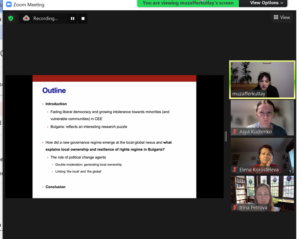
On 16 December 2021, Dr Muzaffer Kutlay from the GCRF COMPASS University of Kent team presented her current research at WiPS. The presentation focused on the governance of minority rights regime in Bulgaria. It studied the peaceful transformation of ethnic relations in the country after the 1990s. Dr Kutlay argued that a new governance regime was built around a new sense of collective identity and common vision for a more inclusive political community — supported by strong local ownership of the new (more inclusive) rights regime. As a result, most of the political and social rights of the Turkish minority were restored. With the help of the complexity thinking, Dr Kutlay investigated how this regime emerged and what made it resilient
ECR Training School ‘Eurasia in transition: Geopolitics and Security 14-18 February 2022
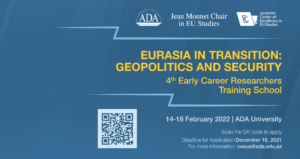 The Center of Excellence in EU Studies announces an open Call for Applications to the 4th International Training School for Early Career Researchers (ECR TS) under the aegis of the Jean Monnet Chairmanship. The ECR TS is scheduled for 14-18 February 2022. The ECR TS’s theme focuses on ‘Eurasia in transition: Geopolitics and Security’ and will review geopolitics and security phenomenon from broader approaches considering the political and socioeconomic transformations, interests of great powers and interaction between themselves and with the states in the central Eurasian region since the collapse of Soviet Union and its implications for international relations. The format of the Training School will be hybrid.
The Center of Excellence in EU Studies announces an open Call for Applications to the 4th International Training School for Early Career Researchers (ECR TS) under the aegis of the Jean Monnet Chairmanship. The ECR TS is scheduled for 14-18 February 2022. The ECR TS’s theme focuses on ‘Eurasia in transition: Geopolitics and Security’ and will review geopolitics and security phenomenon from broader approaches considering the political and socioeconomic transformations, interests of great powers and interaction between themselves and with the states in the central Eurasian region since the collapse of Soviet Union and its implications for international relations. The format of the Training School will be hybrid.
More information about the ECR TS and the Application Form is available here.
“An education is the investment with the greatest returns” (B. Franklin)
 On 9 December 2021 the Office of Svetlana Tikhanovskaya organised a webinar on ‘Education in Belarus and EU Educational Projects for the Belarusians’, moderated by Prof. Elena Korosteleva. The discussion focused on current challenges of education in Belarus, including mass persecution and dismissal of students and staff, as well as lowering standards of education provision across all levels, to see what could be done, to reform the sector, and to retain the intellectual capital for the future of the country. The speakers included Prof. Tatiana Shchyttsova, OST advisor on education; Andrei Yahorau, Director of the Centre for European Transformation;Tsimafei Malakhouski, coordinator of Honest University, and Berend de Groot, Head of Cooperation, EU delegation, Belarus.
On 9 December 2021 the Office of Svetlana Tikhanovskaya organised a webinar on ‘Education in Belarus and EU Educational Projects for the Belarusians’, moderated by Prof. Elena Korosteleva. The discussion focused on current challenges of education in Belarus, including mass persecution and dismissal of students and staff, as well as lowering standards of education provision across all levels, to see what could be done, to reform the sector, and to retain the intellectual capital for the future of the country. The speakers included Prof. Tatiana Shchyttsova, OST advisor on education; Andrei Yahorau, Director of the Centre for European Transformation;Tsimafei Malakhouski, coordinator of Honest University, and Berend de Groot, Head of Cooperation, EU delegation, Belarus.
The Future of the EU’s Eastern Partnership, 9 December 2021
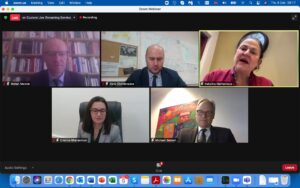 Prof. Elena Korosteleva was invited to join a high-level think-tank discussion of the prospects for Eastern Partnership (EaP), in the advent of the EaP EU summit next week. The event was organised DG NEAR and DGAP to address the challenges in the eastern neighbourhood including ‘the empty seat crisis’ for Belarus, Russia’s threat of Ukraine, further reforms in Moldova and Georgia, and how to ensure stability and dialogue between Armenia and Azerbaijan. The core speakers were Katarina Mathernova (Deputy DG for Eastern Neighbourhood, Commission); Michael Siebert (Managing Director for Russia, EaP, Central Asia, EEAS); Dr Cristina Gherasimov (Head of Office, Senior Policy Advisor to the President of Moldova); and Vano Chkhikvadze (EU Integration Programme Manager, OS Georgia), moderated by Dr Stefan Meister (DGAP). The programme is available here.
Prof. Elena Korosteleva was invited to join a high-level think-tank discussion of the prospects for Eastern Partnership (EaP), in the advent of the EaP EU summit next week. The event was organised DG NEAR and DGAP to address the challenges in the eastern neighbourhood including ‘the empty seat crisis’ for Belarus, Russia’s threat of Ukraine, further reforms in Moldova and Georgia, and how to ensure stability and dialogue between Armenia and Azerbaijan. The core speakers were Katarina Mathernova (Deputy DG for Eastern Neighbourhood, Commission); Michael Siebert (Managing Director for Russia, EaP, Central Asia, EEAS); Dr Cristina Gherasimov (Head of Office, Senior Policy Advisor to the President of Moldova); and Vano Chkhikvadze (EU Integration Programme Manager, OS Georgia), moderated by Dr Stefan Meister (DGAP). The programme is available here.
Connectivity in Central Asia and the Caucasus (6-9 December 2021) GCRF COMPASS Cambridge Signature Conference
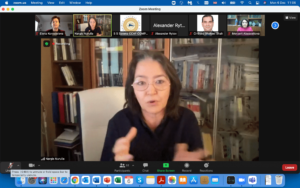 The final 4-day GCRF COMPASS Cambridge signature conference kicked in today, 6 December 2021. Titled as ‘Connectivity in Central Asia and the Caucasus’, it will host an amazing range of speakers from across the globe. Welcome words were provided by Professor Elena Korosteleva (PI) and Dr Siddharth Saxena (COI) reflecting on the project’s progress and challenges. This was further expanded by Prof. Magnus Marsden (Sussex), COMPASS Advisory Board member; Prof. Shailaja Fennell (Cambridge); Nick Ray (Cambridge) and Shakeel Shah (CAREC Institute). The first panel presented a diverse range of topics and geography, varying from the philosophy of knowledge in Central Asia (Dr Nargis Nurulla-Khodjaeva, MGU) to capacity-building activities in Belarus (Alexandr Rytov), Azerbaijani youth (Abbas Babaev), Taliban takeover in Afghanistan (DrAkram Umarov) and the rise of peoplehood in Belarus and Ukraine (Dr Asya Kudlenko). The day concluded with discussion of resilience and fragility and a keynote by Prof. Marsden on ‘Commerce, cuisine and cultural exchange in Afghanistan, Eurasia and beyond’. More information and full programme available here.
The final 4-day GCRF COMPASS Cambridge signature conference kicked in today, 6 December 2021. Titled as ‘Connectivity in Central Asia and the Caucasus’, it will host an amazing range of speakers from across the globe. Welcome words were provided by Professor Elena Korosteleva (PI) and Dr Siddharth Saxena (COI) reflecting on the project’s progress and challenges. This was further expanded by Prof. Magnus Marsden (Sussex), COMPASS Advisory Board member; Prof. Shailaja Fennell (Cambridge); Nick Ray (Cambridge) and Shakeel Shah (CAREC Institute). The first panel presented a diverse range of topics and geography, varying from the philosophy of knowledge in Central Asia (Dr Nargis Nurulla-Khodjaeva, MGU) to capacity-building activities in Belarus (Alexandr Rytov), Azerbaijani youth (Abbas Babaev), Taliban takeover in Afghanistan (DrAkram Umarov) and the rise of peoplehood in Belarus and Ukraine (Dr Asya Kudlenko). The day concluded with discussion of resilience and fragility and a keynote by Prof. Marsden on ‘Commerce, cuisine and cultural exchange in Afghanistan, Eurasia and beyond’. More information and full programme available here.
‘The Influence of Small States: Belarus’ Foreign Policy and State Identity’ GCRF COMPASS PhD success:
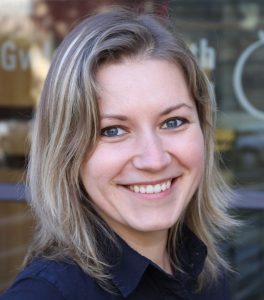 Tanya Radchuk, GCRF COMPASS Doctoral affiliate, passed her viva yesterday, 6 December 2021, with flying colours (and minor corrections). Tanya’s thesis is entitled ‘The Influence of Small States: Belarus’ Foreign Policy and State Identity’. Her supervisors were Prof. Korosteleva and Associate Prof. Ingvild Bode (SDU). Her examiners were Dr Pak Lee (internal) and Prof. David Marples (Alberta, Canada).
Tanya Radchuk, GCRF COMPASS Doctoral affiliate, passed her viva yesterday, 6 December 2021, with flying colours (and minor corrections). Tanya’s thesis is entitled ‘The Influence of Small States: Belarus’ Foreign Policy and State Identity’. Her supervisors were Prof. Korosteleva and Associate Prof. Ingvild Bode (SDU). Her examiners were Dr Pak Lee (internal) and Prof. David Marples (Alberta, Canada).
‘Changing Belarus in the XXI century’ – group discussion of forthcoming book by Professor Korosteleva, Dr Irina Petrova and Dr Asya Kudlenko
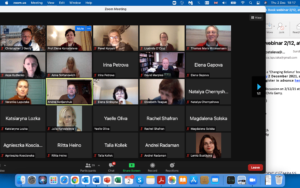 On 2 December, as part of the GCRF COMPASS-OBO initiative, Professor Korosteleva, together with her co-editors Dr Irina Petrova and Asya Kudlenko, organised a group discussion of their forthcoming book ‘Changing Belarus in the XXI century’. The discussion was chaired by Professor Chris Gerry (also a contributor to the book), and was structured along the following three parts: Part I – History; Part II – Current Landscape (Economy; the Judiciary and Constitutional Change) and Part III – Civil Society, Identity and the Future. Book contributors were invited to briefly outline their ideas, which was followed by Q&A.
On 2 December, as part of the GCRF COMPASS-OBO initiative, Professor Korosteleva, together with her co-editors Dr Irina Petrova and Asya Kudlenko, organised a group discussion of their forthcoming book ‘Changing Belarus in the XXI century’. The discussion was chaired by Professor Chris Gerry (also a contributor to the book), and was structured along the following three parts: Part I – History; Part II – Current Landscape (Economy; the Judiciary and Constitutional Change) and Part III – Civil Society, Identity and the Future. Book contributors were invited to briefly outline their ideas, which was followed by Q&A.
13th Annual Assembly of the Eastern Partnership Civil Society Forum, 30 November 2021
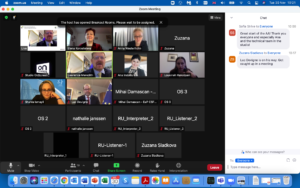 Professor Korosteleva was invited to chair a high-level panel debate ‘Policy check ahead of the Eastern Partnership Summit’. This high-level panel addressed the major ambitions, political challenges and policy objectives ahead of the upcoming EaP Summit, and also the expectations for EU-EaP relations in the coming years by various stakeholders coming from the EU and EaP sides. For the EaP summit to embark on a path of successful recovery, the impact of the crisis, conflicts and regression of human rights were discussed with recommendations to be issued to the EaP Summit, on behalf of the CFS. The panel included Luc Devinge, EEAS Deputy Managing Director for Russia, EaP, Central Asia, Regional Cooperation and OSCE; HE Anna Westerholm, Ambassador for the EaP at the Swedish Ministry for Foreign Affairs; Laurence Meredith, Director DG NEAR European Commission; Lousineh Hakobyan, President of Europe in Law Association, EaP CSF SC member Armenia; and Shahla Ismayil, Chairperson, Women’s Association for Development, EaP CSF SC member, Azerbaijan. For full information visit here
Professor Korosteleva was invited to chair a high-level panel debate ‘Policy check ahead of the Eastern Partnership Summit’. This high-level panel addressed the major ambitions, political challenges and policy objectives ahead of the upcoming EaP Summit, and also the expectations for EU-EaP relations in the coming years by various stakeholders coming from the EU and EaP sides. For the EaP summit to embark on a path of successful recovery, the impact of the crisis, conflicts and regression of human rights were discussed with recommendations to be issued to the EaP Summit, on behalf of the CFS. The panel included Luc Devinge, EEAS Deputy Managing Director for Russia, EaP, Central Asia, Regional Cooperation and OSCE; HE Anna Westerholm, Ambassador for the EaP at the Swedish Ministry for Foreign Affairs; Laurence Meredith, Director DG NEAR European Commission; Lousineh Hakobyan, President of Europe in Law Association, EaP CSF SC member Armenia; and Shahla Ismayil, Chairperson, Women’s Association for Development, EaP CSF SC member, Azerbaijan. For full information visit here
GCRF COMPASS receives “Highly Commended” accolade in International Collaboration of the Year category at 2021 THE Awards
 Commenting after the awards ceremony, Prof. Korosteleva (PI) said: ‘We are delighted to announce that our project has been singled out as the most HIGHLY COMMENDABLE under the category of international collaboration, selected out of five hundred submitted and five shortlisted projects! The winning award deservedly went to the Liverpool School of Tropical Medicine, for their achievements in the fight against COVID-19, and we were cited alongside the winners.
Commenting after the awards ceremony, Prof. Korosteleva (PI) said: ‘We are delighted to announce that our project has been singled out as the most HIGHLY COMMENDABLE under the category of international collaboration, selected out of five hundred submitted and five shortlisted projects! The winning award deservedly went to the Liverpool School of Tropical Medicine, for their achievements in the fight against COVID-19, and we were cited alongside the winners.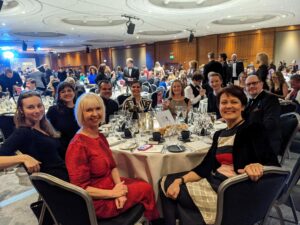 It is not so much about the recognition that matters – it is about the people involved in the project who have made it a real success!’
It is not so much about the recognition that matters – it is about the people involved in the project who have made it a real success!’More information and details of the 2021 winners in all categories can be found here.
GCRF COMPASS ADA Early Career Researcher Training School ‘Human Security in a Globalizing World’
The GCRF COMPASS/ADA ECR Training School was organised in Baku, Azerbaijan on 15-19 February 2021. The proceedings are available here
26 November 2021 – ‘Archaeological Exploration of ‘Silk Road Cities’ in Central Asia’
Cambridge Central Asia Forum in collaboration with the Centre of Development Studies, University of Cambridge invites you to a talk by Katie Campbell, King’s Silk Roads Programme, University of Cambridge on 26 November at 11am-1pm (UK)
Register in advance: https://cam-ac-uk.zoom.us/meeting/register/tJModuyrpzIsHtAqgAhiw_rippO-pyTBVt6z
For more information please go to:
https://centralasia.group.cam.ac.uk/events/cambridge-central-asia-forum-gcrf-compass-centre-development-studies-seminar-series
This seminar series is organised in collaboration with UKRI GCRF COMPASS Project & School of International Studies at Jeonbuk National University (Republic of Korea)
24 November 2021 – ‘Resilience awareness among hamsoya in time of the “absurd”: Philosophical reflections on Afghani-stan and -stans around’ – Dr Nargis Nurulla–Khodzhaeva
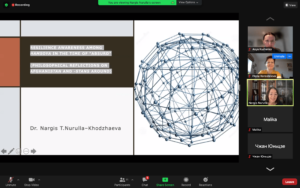
On 24 November 2021, the University of Kent team hosted a WiPS discussion with Dr Nargis Nurulla–Khodzhaeva (Lomonosov Moscow State University, Russia). The discussion focused on the growing perceptivity of “absurd” of the (post-)pandemic time by revisiting ideas from Sufi (Ibn Arabi, Al Ghazali, Rumi) and modern philosophy (Derrida and Foucault).
23 November 2021 – Dr Ulugbeck Khasanov (UWED) interviewed on analytical TV Program on Uzreport channel on EU-Belarussian Republic Diplomatic Collision.
Full programme available here.
Adham Khudaykulov awarded the James Claydon Prize for the most outstanding PhD in Economics subjects
Dr Siddharth Saxena’s recent PhD Student, Adham Khudaykulov, from Cambridge and the CCA Forum has been awarded the James Claydon Prize for the most outstanding PhD in Economics subjects by St Edmunds College, University of Cambridge. Adham Khudaykulov is currently teaching at BMU Tashkent.
GCRF COMPASS ADA Signature Conference ‘Connecting the 3Bs: Brussels, Baku, Beijing. The EU/UK & China cooperation initiatives for greater connectivity of Eurasia: the role of Azerbaijan’
The GCRF COMPASS/ADA Signature Conference took place virtually on 16/17 June 2021. The Conference Proceedings are now available here.
Third GCRF COMPASS-OBO Webinar focusing on Belarus’s economy
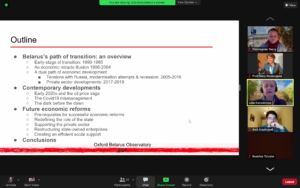 On 18 November 2021 a third GCRF COMPASS-Oxford Belarus Observatory (OBO) webinar took place online, convened by Professor Christopher Gerry (OSGA) and Professor Elena Korosteleva. It was titled ‘Stolen decades: the unfulfilled expectations of the Belarusian economic miracle’ and delivered byProfessor Julia Korosteleva (UCL SSEES) and Ales Alakhnovich (economic advisor to Svetlana Tikhanovskaya). They examined thirty years of Belarus’s economy arguing that the so called ‘Belarusian miracle’ had finally exhausted itself, revealing Belarus’ deep and unhealthy dependency on Russia, and a desperate need for reform required for a failing economic state. The paper is part of the forthcoming book ‘Changing Belarus in the 21 century’ commissioned by Routledge.
On 18 November 2021 a third GCRF COMPASS-Oxford Belarus Observatory (OBO) webinar took place online, convened by Professor Christopher Gerry (OSGA) and Professor Elena Korosteleva. It was titled ‘Stolen decades: the unfulfilled expectations of the Belarusian economic miracle’ and delivered byProfessor Julia Korosteleva (UCL SSEES) and Ales Alakhnovich (economic advisor to Svetlana Tikhanovskaya). They examined thirty years of Belarus’s economy arguing that the so called ‘Belarusian miracle’ had finally exhausted itself, revealing Belarus’ deep and unhealthy dependency on Russia, and a desperate need for reform required for a failing economic state. The paper is part of the forthcoming book ‘Changing Belarus in the 21 century’ commissioned by Routledge.
Developing cooperation with Southern Denmark Union (SDU)
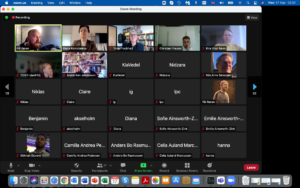 Professor Korosteleva was invited to give a public lecture (online) at the Centre for War Studies SDU on 17 November 2021, addressing the current challenges for European governance in the context of the Belarus-EU border crisis. It was convened by Professor Trine Flockhart, and attended by the students and staff of the SDU, as well as the guest researchers of the Centre. On 18 November Professor Korosteleva also participated, in person, in a research workshop, organised by DIAS, sharing her experience of being PI to large grants, and discussing new opportunities for collaboration.
Professor Korosteleva was invited to give a public lecture (online) at the Centre for War Studies SDU on 17 November 2021, addressing the current challenges for European governance in the context of the Belarus-EU border crisis. It was convened by Professor Trine Flockhart, and attended by the students and staff of the SDU, as well as the guest researchers of the Centre. On 18 November Professor Korosteleva also participated, in person, in a research workshop, organised by DIAS, sharing her experience of being PI to large grants, and discussing new opportunities for collaboration.
15th November 2021: BBC Radio Scotland interview with Professor Elena Korosteleva on escalating EU/Belarus border crisis

Professor Elena Korosteleva: TRT TV Interview on the Belarus border crisis, 09/11/2021.
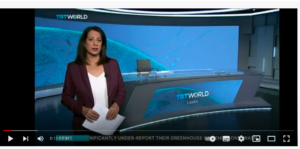
Full interview available here
LBC Radio Interview on Belarus border crisis with Professor Elena Korosteleva, 09/11/2021
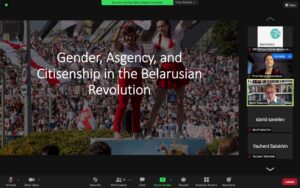 On 4 November GCRF COMPASS-OBO conducted their second international webinar on ‘Agency, Gender and Citizenship in Belarusian Protests’. The talk was delivered by Professor Elena Gapova from Western Michigan University. The discussion focused on the nature of recent Belarusian protests, including their explicit gendered dimension, and explanations for the unprecedented mobilisation of women in Belarus. The webinar attracted over 50 participants from across Europe, including academics, students, FCDO officials and practitioners.
On 4 November GCRF COMPASS-OBO conducted their second international webinar on ‘Agency, Gender and Citizenship in Belarusian Protests’. The talk was delivered by Professor Elena Gapova from Western Michigan University. The discussion focused on the nature of recent Belarusian protests, including their explicit gendered dimension, and explanations for the unprecedented mobilisation of women in Belarus. The webinar attracted over 50 participants from across Europe, including academics, students, FCDO officials and practitioners.
3 November 2021 – ‘Entangled Peace and its Limits’ – Dr Ignasi Torrent
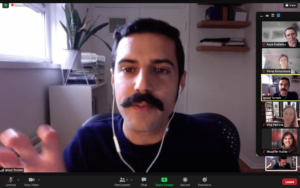
On 3 November 2021, the University of Kent team hosted a WiPS webinar with Dr Ignasi Torrent (University of Hertfordshire, UK). The presentation discussed the suitability of entanglements and relations as a mode of thinking and seeing peacebuilding events. Triggered by a reflection upon the UN’s limited results in the endeavour towards securing lasting peace in war-torn scenarios, Dr Torrent critically engaged with three debates in contemporary peacebuilding literature, including the inclusion of ‘the locals’, the achievement of organisational system-wide coherence and the increasingly questioned agential condition of peacebuilding actors. He suggested that the UN, inattentive to the relational vulnerability of involved stakeholders, seeks to secure a totalising modern ‘distory’, defined as a story that undoes other stories.
2 November 2021: Albena Azmanova awarded International Studies Association’s BEST BOOK prize
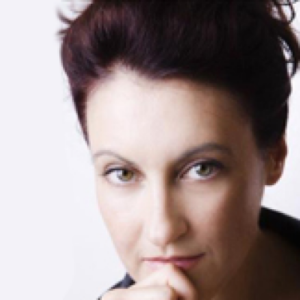 Professor Albena Azmanova, from Kent Brussels and COMPASS project senior research affiliate has been awarded the International Studies Association’s BEST BOOK prize under the International Political Economy section. The selection committee, chaired by Michael Breen, notes: “Capitalism on Edge is a major contribution to thinking regarding some of the really big questions of our time, including the future of contemporary capitalism and the potential for revolutionary change. The book is based on thorough research and makes a powerful argument that is deep, provocative, accessible, and engaging.” Congratulations to Albena!
Professor Albena Azmanova, from Kent Brussels and COMPASS project senior research affiliate has been awarded the International Studies Association’s BEST BOOK prize under the International Political Economy section. The selection committee, chaired by Michael Breen, notes: “Capitalism on Edge is a major contribution to thinking regarding some of the really big questions of our time, including the future of contemporary capitalism and the potential for revolutionary change. The book is based on thorough research and makes a powerful argument that is deep, provocative, accessible, and engaging.” Congratulations to Albena!
International Forum On Innovating and Modernizing Energy and Water in Central Asia, 1-3 November 2021
Dr Saxena was invited to the International Forum on 1-3 November in Kazakhstan. KBTU in collaboration with UNECE, UNESCAP, National Academy of Sciences of the Republic of Kazakhstan, Kazakh-British Technical University, International Green Technologies and Investment Projects Center, CIS Electric Power Council organized a conference on Innovating and Modernizing Energy and Water in Central Asia. He about innovation and science in Central Asia and the need for finding local solutions through cooperation at the International Forum on 2 November. Dr Laumulin, COMPASS Affiliated, also gave a talk at the conference. More information here.
Report Launch: Central Asia Forecasting 2021 – Results from Expert Survey, 2 November 2021
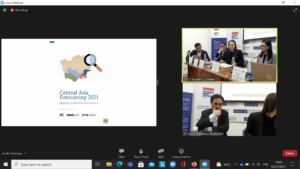 Dr Saxena contributed to the Central Asia Forecasting report. The “Central Asia Forecasting 2021- Results from an Expert Survey” study, jointly implemented by the Friedrich Ebert Foundation (FES), the OSCE Academy in Bishkek, and the SPCE Hub, aims to help strengthen EU–Central Asia relations. The study results are intended to stimulate the debate on the region, foster understanding of the common challenges and opportunities, and encourage data-driven policymaking. It is a pilot project that will be followed by an annual or biennial study to analyze regional trends over time. The audience that we aim to address with this report comprises the broader public in Europe and Central Asia, civil society representatives, regional experts, researchers, and especially EU foreign-policy makers.
Dr Saxena contributed to the Central Asia Forecasting report. The “Central Asia Forecasting 2021- Results from an Expert Survey” study, jointly implemented by the Friedrich Ebert Foundation (FES), the OSCE Academy in Bishkek, and the SPCE Hub, aims to help strengthen EU–Central Asia relations. The study results are intended to stimulate the debate on the region, foster understanding of the common challenges and opportunities, and encourage data-driven policymaking. It is a pilot project that will be followed by an annual or biennial study to analyze regional trends over time. The audience that we aim to address with this report comprises the broader public in Europe and Central Asia, civil society representatives, regional experts, researchers, and especially EU foreign-policy makers.
Roundtable on UK Policy in Afghanistan, 2 November 2021
Dr Saxena moderated a roundtable on UK policy in Afghanistan on 2nd November. The speakers included Ambassador Sir Nicholas Kay, Dr Mehran, Prof Marsden, Dr Ashraf, Mr Zalmai and Mr Yaqin. The roundtable was organized by The Afghan Institute for Strategic Studies (AISS) and the Sussex Asia Centre. The event was live streamed on Facebook. You can watch it on the AISS Facebook page. Follow the link. https://www.facebook.com/watch/?v=402583761359375
28 October 2021 – ‘Contesting the International through the Local’ – Professor Senem Aydın-Düzgit
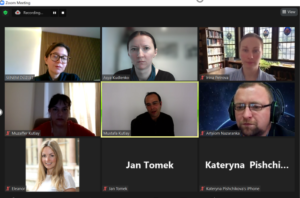 On 28 October 2021, the University of Kent team hosted a WiPS webinar with Prof. Senem Aydın-Düzgit (Sabanci University and Istanbul Policy Center, Turkey). In the presentation, she discussed her current work on Turkey’s contestation of the EU and the Liberal International Order. Prof. Senem Aydın-Düzgit offered a comprehensive analysis of the ways in which Turkey contests the EU’s claims to the liberal international order and the constituent elements of this order in two related steps. First, she identified the arguments put forward by Turkey’s President Erdoğan where he engages in a direct contestation of the EU from the conceptual viewpoint of three understandings of global justice and the international order. Secondly, from the same analytical lens, she focused on the justifications through which he contested the current international order, with a view to observe the parallels and contradictions between the two types of contestation.
On 28 October 2021, the University of Kent team hosted a WiPS webinar with Prof. Senem Aydın-Düzgit (Sabanci University and Istanbul Policy Center, Turkey). In the presentation, she discussed her current work on Turkey’s contestation of the EU and the Liberal International Order. Prof. Senem Aydın-Düzgit offered a comprehensive analysis of the ways in which Turkey contests the EU’s claims to the liberal international order and the constituent elements of this order in two related steps. First, she identified the arguments put forward by Turkey’s President Erdoğan where he engages in a direct contestation of the EU from the conceptual viewpoint of three understandings of global justice and the international order. Secondly, from the same analytical lens, she focused on the justifications through which he contested the current international order, with a view to observe the parallels and contradictions between the two types of contestation.
BKS Webinar: Universities Contributing to Societal Development: The Role of Institutional Autonomy and Academic Freedom, 27 October 2021
Dr Saxena moderated a talk on ‘Universities Contributing to Societal Development: The Role of Institutional Autonomy and Academic Freedom’. The speaker, Dr Chankesliani (Uni of Oxford) talked about how higher education can support global, national, and local development, leading to the outcomes enshrined in the Sustainable Development Goals and going beyond those outcomes. The talk reported on national manifestations of the developmental role of universities in post-Soviet countries, with a focus on Kazakhstan. The talk argued that limited academic freedom and institutional autonomy impede the full realisation of the potential of higher education. The assumptions underpinning academics’ views on how higher education supported development were discussed in light of an innovative framework of essentialist and anti-essentialist approaches. Juxtaposing the national with the global development missions of universities, the talk raised questions on the possibility of delinking higher education from the immediate human capital and modernisation needs of the nation-state and becoming concerned with the global; on promoting freedom to cultivate intellectual curiosity through education and research, and stimulating a more holistic imaginary of the developmental purposes of higher education.
GCRF COMPASS – REES/OSGA Oxford partnership’s first event
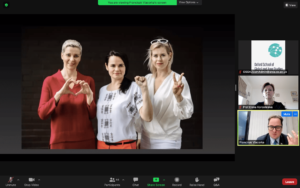 On 21 October 2021, Prof. Chris Gerry, PI and Head of OSGA, and Prof. Elena Korosteleva COI, launched a series of Oxford Belarus Observatory (OBO) webinars on Belarus. This auspicious event was opened with a talk by Franak Viachorka, Senior Advisor to Sviatlana Tsikhanouskaya, and non-residential Fellow at the Atlantic Council’s Eurasia Centre.
On 21 October 2021, Prof. Chris Gerry, PI and Head of OSGA, and Prof. Elena Korosteleva COI, launched a series of Oxford Belarus Observatory (OBO) webinars on Belarus. This auspicious event was opened with a talk by Franak Viachorka, Senior Advisor to Sviatlana Tsikhanouskaya, and non-residential Fellow at the Atlantic Council’s Eurasia Centre. 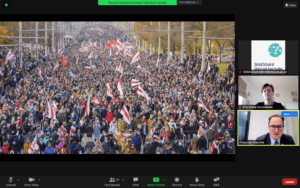
Franak’s talk was titled ‘KGB vs Youtubers. How technology and self-organisation became the driving force of Belarus’ peaceful revolution’, followed by nearly two hours of Q&A. The link to the event could be found here .
21 October – Millennium conference
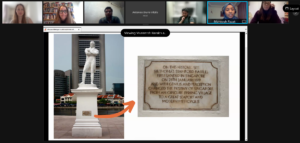 On 23 October 2021, Professor Elena Korosteleva and Dr Irina Petrova presented their ongoing research at the Millennium conference ‘(Re)Writing the International: Interrogating
On 23 October 2021, Professor Elena Korosteleva and Dr Irina Petrova presented their ongoing research at the Millennium conference ‘(Re)Writing the International: Interrogating
Histories, Imagining Futurities’ (22-24 October 2021). The presentation ‘Rethinking ‘the International’ in Complex International Relations’ problematized the notions of ‘the local’, ‘the global’, and ‘the international’. Instead of simplified and reductionist binary thinking, the presentation argued, we should rethink international engagement from the perspective of a relational universe where positionality in a dynamic entanglement of relations plays a more significant role. Further information about the conference is available here.
23 October – Round table “EU policy transfer in the post-Soviet space”
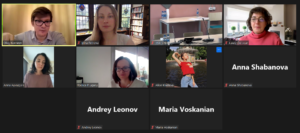 On 23 October 2021, Dr Irina Petrova participated in the round table “EU policy transfer in the post-Soviet space” organised by the National Research University Higher School of Economics – St. Petersburg, Russian Association of Political Science, Interregional center STRATEGY, with the support of the Friedrich Ebert Foundation branch in Russia. The panel also featured Oleg Korneev, Farhad Mukhtarov, Laure Delcour, Anna Ayvazyan and Rodica Plugaru. The discussion focused on bridging the rationalist-constructivist divide in the EU policy transfer studies and going beyond by employing complex International Relations. Further information about the round table can be found here.
On 23 October 2021, Dr Irina Petrova participated in the round table “EU policy transfer in the post-Soviet space” organised by the National Research University Higher School of Economics – St. Petersburg, Russian Association of Political Science, Interregional center STRATEGY, with the support of the Friedrich Ebert Foundation branch in Russia. The panel also featured Oleg Korneev, Farhad Mukhtarov, Laure Delcour, Anna Ayvazyan and Rodica Plugaru. The discussion focused on bridging the rationalist-constructivist divide in the EU policy transfer studies and going beyond by employing complex International Relations. Further information about the round table can be found here.
21 October – Oxford-Belarus Observatory ‘KGB vs Youtubers. How technology and self-organization became the driving force of Belarus peaceful revolution’
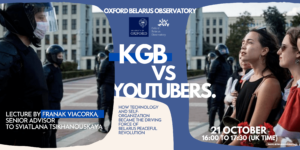 21 October 16:00 to 17:30 via Zoom Convenors: Professor Christopher Gerry & Professor Elena Korosteleva.
21 October 16:00 to 17:30 via Zoom Convenors: Professor Christopher Gerry & Professor Elena Korosteleva.13 October 2021 – ‘The role of ‘the Local’ in the Age of Complexity: Reconceptualising Local Ownership in the EU Foreign Policy’ – Professor Elena Korosteleva and Dr Irina Petrova
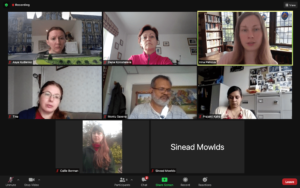 On 13 October 2021 GCRF COMPASS hosted WiPS webinar with Professor Elena Korosteleva (University of Kent) and Dr Irina Petrova (UCL and University of Kent). The discussion focused on the role of the local and local ownership in the EU Foreign Policy. The speakers argued that in the context of ongoing deep transformations of the international system and the ultimately limited effectiveness of existing policy tools, the EU needed to profoundly rethink its modes of engagement and integration with a wider Europe and Eurasia. Using complexity theory as the main framework, they posited that in the VUCA world — the world of increasing volatility, uncertainty, complexity and ambiguity – it was at level of the local that the most effective problem-solving was possible, while pre-defined ‘global’ policy templates were proving ineffective and even futile.
On 13 October 2021 GCRF COMPASS hosted WiPS webinar with Professor Elena Korosteleva (University of Kent) and Dr Irina Petrova (UCL and University of Kent). The discussion focused on the role of the local and local ownership in the EU Foreign Policy. The speakers argued that in the context of ongoing deep transformations of the international system and the ultimately limited effectiveness of existing policy tools, the EU needed to profoundly rethink its modes of engagement and integration with a wider Europe and Eurasia. Using complexity theory as the main framework, they posited that in the VUCA world — the world of increasing volatility, uncertainty, complexity and ambiguity – it was at level of the local that the most effective problem-solving was possible, while pre-defined ‘global’ policy templates were proving ineffective and even futile.
UK-Belarus strategy workshop
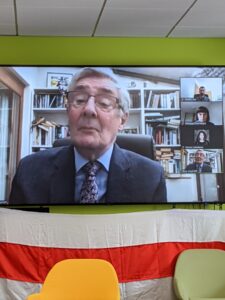
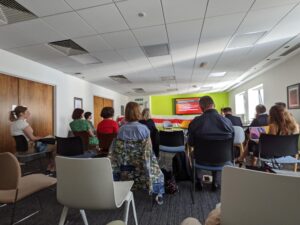 On 22 September 2022, Professor Elena Korosteleva and Dr Irina Petrova participated in a workshop on the UK-Belarus strategy in a time of crisis, hosted by UCL SSEES. The workshop included parliamentarians led by Anthony Lloyd, Chair of Belarus APPG, representatives of Svetlana Tikhanovskaya’s office, UK officials, academic experts and NGO representatives. The workshop focused on addressing the key issues of crisis towards designing peaceful pathways for its conciliation.
On 22 September 2022, Professor Elena Korosteleva and Dr Irina Petrova participated in a workshop on the UK-Belarus strategy in a time of crisis, hosted by UCL SSEES. The workshop included parliamentarians led by Anthony Lloyd, Chair of Belarus APPG, representatives of Svetlana Tikhanovskaya’s office, UK officials, academic experts and NGO representatives. The workshop focused on addressing the key issues of crisis towards designing peaceful pathways for its conciliation.
Cambridge Workshop on Critical Analyses of 30 years of Economic Reforms in Central Asia and Russia, Uni of Cambridge, 17 September 2021
Cambridge Central Asia Forum in collaboration with University of Kent’s School of Social Policy, Sociology and Social Research hosted a one day workshop on the ‘Critical nalyses of 30 years in Central Asia and Russia’. The speakers included Kuat Akizhanov (KazGUU Uni), Ilya Matveev (Russian Presidential Academy of National Economy and Public Administration), Hasan H. Karrar (Lahore University of Management Sciences), Chokan Laumulin (Kazakh-British Technical University), ommaso Trevisani (University of Naples L’Orientale), Franco Galdini (University of Manchester), Lorena Lombardozzi (The Open University), Balihar Sanghera and Elmira Satybaldieva (University of Kent). The sessions were chaired by Dr Saxena (Uni of Cambridge, CO-I GCRF COMPASS).
Cambridge IR and History Conference, 17 September 2021
Prajakti Kalra gave a talk on world orders in the Conference organized by POLIS, Cambridge on 17 September. The conference was moderated by Prof Ayse Zarakol and introductory remarks were made by Prof Sharman. Ms Kalra’s talk was on the Mongol World Order in medieval Eurasia. The Mongol World Order was used as a point of departure to decolonize IR which is western and Euro-centric by definition. The other themes in the conference included hierarchy and agency in the International Order in the modern era.
‘International Relations and Diplomacy in the Post-Pandemic World’ 13-15 September: Jagiellonian University (Krakow)
At the invitation of Jagiellonian University (Krakow), Professor Elena Korosteleva virtually participated at the conference ‘International Relations and Diplomacy in the Post-Pandemic World’ 13-15 September. Elena spoke about what makes communities resilient in a post-pandemic world, in the context of Complex IR, and introduced the forthcoming Special Issue in Cambridge Review of International Affairs, with a similar title. The panel included NAWA Prof. Emilian Kavalski, Prof. Maximillan Mayer, Prof. Pawel Laider and other. The conference also discussed joint project initiatives and funding opportunities to support them.
Uzbek Embassy Reception: Official Delegation of Uzbekistan with the House of Lords, to celebrate 30 years of Independence of Uzbekistan.
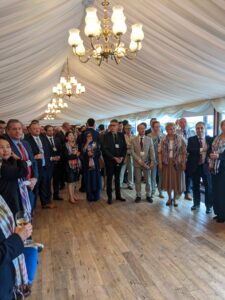
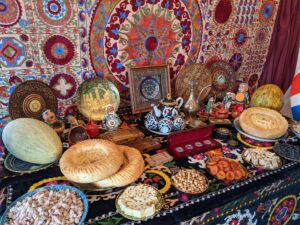 On 9 September 2021, Professor Elena Korosteleva and Dr Montu Saxena were invited to attend a reception organised conjointly by the Uzbek Embassy and the Official Delegation of Uzbekistan with the House of Lords, to celebrate 30 years of Independence of Uzbekistan. The event included Members of Parliament, both chambers led by Uzbekistan AGGP, EBRD members, friends of the Uzbek Society, experts and other officials.
On 9 September 2021, Professor Elena Korosteleva and Dr Montu Saxena were invited to attend a reception organised conjointly by the Uzbek Embassy and the Official Delegation of Uzbekistan with the House of Lords, to celebrate 30 years of Independence of Uzbekistan. The event included Members of Parliament, both chambers led by Uzbekistan AGGP, EBRD members, friends of the Uzbek Society, experts and other officials. 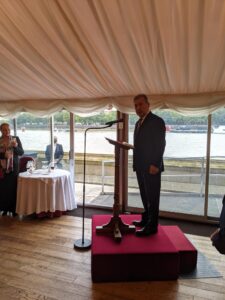 The event was followed by a roundtable at the Uzbek Embassy, involving Senator Sodyq Safoev (former Minister of Foreign affairs; 1st Deputy Chairman of the Senate and Rector of UWED) , Bobur Usmanov (Deputy Secretary of Security Council), Elena Borisova MP (Chair of the Committee for Public Health in Oliy Majilis), and Obid Khakimov (Director of the Centre for economic Research and Deputy Advisor to the President).
The event was followed by a roundtable at the Uzbek Embassy, involving Senator Sodyq Safoev (former Minister of Foreign affairs; 1st Deputy Chairman of the Senate and Rector of UWED) , Bobur Usmanov (Deputy Secretary of Security Council), Elena Borisova MP (Chair of the Committee for Public Health in Oliy Majilis), and Obid Khakimov (Director of the Centre for economic Research and Deputy Advisor to the President).
38th International Symposium on Economic Crime, Uni of Cambridge, 5-12 September 2021
Dr Saxena was invited to the 38th International Symposium on Economic Crime from 5-12 September. He gave a talk in the panel entitled: Legal issues along the Belt and Road Initiative outside of China, chaired by Mr Theodore Huckle QC, Barrister, Doughty Street Chambers and former HM Counsel General for Wales and Master of the Bench of Lincoln’s Inn, UK.
The Global Challenges Research Fund (GCRF) COMPASS project has been shortlisted for the International Collaboration of the Year at the Times Higher Education (THE) Awards 2021, widely known as ‘the Oscars of Higher Education’
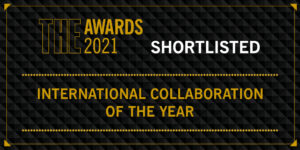 The Global Challenges Research Fund (GCRF) COMPASS project, hosted by the University of Kent in partnership with the University of Cambridge (UK), ADA University (Azerbaijan), Belarusian State University (Belarus), TNU (Tajikistan) and the University of World Economy and Diplomacy (Uzbekistan), has been shortlisted for the International Collaboration of the Year at the Times Higher Education (THE) Awards 2021.
The Global Challenges Research Fund (GCRF) COMPASS project, hosted by the University of Kent in partnership with the University of Cambridge (UK), ADA University (Azerbaijan), Belarusian State University (Belarus), TNU (Tajikistan) and the University of World Economy and Diplomacy (Uzbekistan), has been shortlisted for the International Collaboration of the Year at the Times Higher Education (THE) Awards 2021.
The GCRF COMPASS project works with higher education institutions (HEIs) from former Soviet Republics to develop global partnerships and more sustainable learning capacities through resilience in the face of adversity and crisis. Led by Professor Elena Korosteleva, in partnership with Dr Siddharth Saxena (COI, Cambridge), Rosalind Beeching (Project Manager, Kent) and Prajakti Kalra (Research & Communication Officer, Cambridge), the GCRF COMPASS consortium involves six Research Institutions, 24 members of staff and 100 affiliates. For its success it owes especially to the younger generation of scholars including but not limited to Dr Irina Petrova, Dr Muzaffer Kutlay, Dr Diana Kudaibergenova and Dr Anastasiya Kudlenko for their incredible enthusiasm, dedication and scholarship!
 The project has been recognised by the judge’s panel of THE Awards 2021 for its creative collaborations, imaginative communication of research results, and tremendous achievements in difficult circumstances of war, conflict, uprisings, Brexit and the COVID-19 pandemic. The full press release can be found here.
The project has been recognised by the judge’s panel of THE Awards 2021 for its creative collaborations, imaginative communication of research results, and tremendous achievements in difficult circumstances of war, conflict, uprisings, Brexit and the COVID-19 pandemic. The full press release can be found here.
